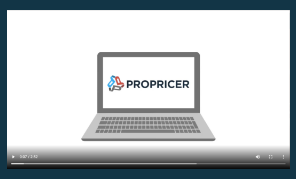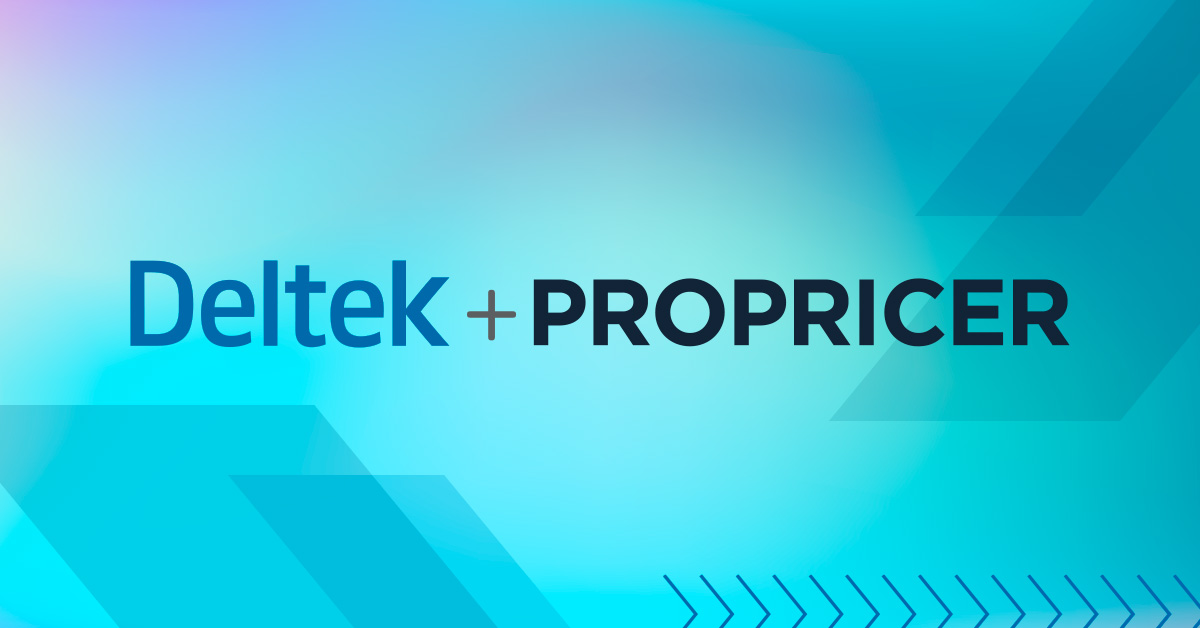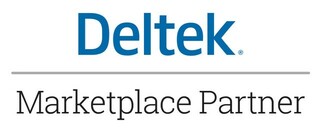In a tech-forward Speed to Contract, Speed to Market podcast episode, host Tim Templeton speaks with Mr. Kevin Plexico, VP of Information Solutions at Deltek. Their talk focuses on technologies to enhance the efficiency of the U.S. government and how contracting firms can put their best products forward with viable technologies to become a valuable resource for our nation and its defense.
Below are excerpts from the interview, edited for brevity and clarity.
Deltek streamlines process to make contractors ultra-efficient & hone unique proposal skills
Deltek is a company that is built around the servicing of other companies that are project-based businesses. So, think of companies that are delivering construction projects, professional services projects, and technology projects. Our lifeblood is “How do we help, through software and tools, companies that have the success of a government project as their lifeblood?”
This community has problems that are very unique. The missions of a government agency are about as different from a commercial company’s as any other kind of difference you could think of: they’re about protecting the nation and protecting our borders.
Warfighters obviously have unique needs in terms of the capabilities and weapon systems they require to be successful in our wars overseas as well as while protecting our nation. So our focus at Deltek is really around “How do we make the companies that are delivering projects successful in their execution so that the agencies they're working with can be successful in their missions?”
A benefit of doing business with the government? Potentially having a lifelong customer
Take a company that is really good at what they do and has some unique capabilities and strengths—maybe they build software or services. If they don't understand the unique requirements that government agencies impose, by law, on the way that a contractor has to work with them, that contractor could provide the best widget or the best service in the world, and they would still fall down doing work with a government agency.
And I think that's the unique aspect of the government market. In particular, the federal market. They have such a specialized way of doing business—everything from the Federal Acquisition Regulations (FAR) that dictate how they buy to regulations that might affect a contractor company's human resource management. Or it might affect a firm’s financial operations or its information security practices and policies.
So if your contracting company wants to do business with a government agency, you need to be prepared to take on the requirements the agency is going to insist on if you sign that contract. I always say that your first government contract is probably going to be the most expensive contract you ever win because of all the foundation-laying that you have to do in order to be able to support that contract.
And it's not like the government buyer or the General in the Department of Defense is doing this to be difficult. It's just that they're a public agency. They serve the public. They're funded by taxpayer dollars, so as a public steward of funds, they have to make sure that the way they go about their business is above-board, rigorous, and effectively using the resources that are available. And that's where lawmakers come in: to define what those requirements are, so agencies can't make a procurement without embracing them.
If I'm a small business, I can go buy whatever I want, whenever I want, any way I want. I don't have to “compete” it, whatever “it” may be. I can just pick somebody. I don't have to care about how they manage it. I can just say, "Hey, we'll pay this amount as long as you fulfill the mission."
Government buyers don't have that latitude. They have rules, regulations, and processes that are there because they are public servants and public stewards.
That's typically the biggest obstacle for a company that's coming into the government market. They think they're really good at what they do, and they don't necessarily always understand why these requirements are in place. And they kind of have to get past that to accept that if you want to do business with a government agency, the work comes with those kinds of additional challenges.
But the benefits? In all likelihood, if you do good work, you'll have a customer for life, and it will open up opportunities for you to do business with a lot of other agencies that might have similar or complementary missions. You've now figured out how to navigate those requirements and can replicate them relatively easily for the next time you're engaging with another customer who might have a similar requirement you can fulfill.
The big advantage for firms that use innovations like GovWin IQ and APIs
We talked about the complexity of doing business with a government agency; it affects every element of a company's operations. This is one of the reasons we're really excited about Deltek’s relationship with ProPricer.
If you think about the journey of a company in identifying an opportunity or procurement, bidding on it, and then executing against it, there are a lot of systems that are involved in that process. I just described it in one sentence, but to unpack that in terms of all its complexity is a totally different challenge.
Take our GovWin IQ product, which is a market intelligence solution that's intended to help companies that have good capabilities get into an agency early in the buying cycle so they have an opportunity to influence how a proposed solution is composed.
Once a government agency gets to the point where they're announcing a procurement, they've made a lot of decisions about the way they're going to go about that procurement. And if you weren't in their minds with the fresh ideas that you might be able to bring to it, you're not going to have much opportunity at that point to influence the way that solution is developed. It's already done.
So, we help companies get in there early to shape the requirements and educate the buyer before the procurement officer gets their clutches into the solicitation and the process—it’s an opportunity to help influence what comes out in the solicitation.
Once you decide the price and decide to bid, obviously, you’re drawing extensively on your firm’s financial information. And we at Deltek have Costpoint, our flagship ERP solution and financial management system for the government contracting space, which is really purpose-built for a government contractor.
If you bid on a contract, you could be subject to audit by an agency that's going to verify you’ve accounted for the costs on that contract correctly. That's a major input into the pricing decision. What are your overhead rates? What are your costs and your cost structure?
The makeup of your price is comprised of two elements: You need the price to win the contract but also the price that still allows you to make a profit and be successful financially on that project. Most companies are not charitable organizations. They're profit-seeking organizations.
For us at Deltek, being able to seamlessly tie those capabilities together through an API or an exchange of data allows your contracting firm to get the best of the solutions.
There are obviously many more solution combinations we could talk about. Solutions that can talk to each other so that you as a contractor are not taking data from one, reentering into another system, drawing inputs from that, and reentering that into yet another system—and all the back and forth that can go into this. If the solutions are tied together and the right information is exchanged, then that's literally saving somebody weeks of work and probably allowing them to deliver a much higher-quality proposal and price structure in the process.
Strategies that will change the game & impact speed to contract, speed to market
One of the biggest trends that we've seen at Deltek is the move of government agencies from buying things through what I would describe as the traditional Request for Proposal (RFP) process to drawing on the benefits of, I'll use the term IDIQ, or Indefinite Delivery/Indefinite Quantity.
If you're not in the government market, that won't mean much to you, but think of it this way: You have a master contract that already has a lot of the terms and conditions negotiated, which is often the heavy-lift for the government agency to implement. Once you have that in place, the work comes. I've got a statement of work for a discrete piece of work that I need to have fulfilled, and once I have that master contract in place, I can award that piece of work much more quickly.
I know when I entered this industry, it was not uncommon to have technology buys that were three and four years long. And what they wanted to buy at the beginning of the acquisition process and what they ended with four years later was totally antiquated technology, and you'd be like, "Why are you even buying this?" But it was too late. That was the process and the cycle that the government market was, even in the defense industry.
So I think things like transparency are a really important way for government agencies and industry to make sure they're collaborating and sharing information that can get to the best solution possible faster.
I know that government agencies are risk-averse. They're concerned with fairness and equity in competitions, and they're literally afraid to share information that might be viewed as “You shared it with one company but not another, and therefore gave one company an advantage.”
But there are a lot of ways around that. I think it's getting over that risk aversion in some cases that still allows for a level playing field but allows transparency in the solution process so that the best ideas can be pulled together. And I think IDIQ contracts accelerate the acquisition process so that those solutions can be bought, and by the time they're implemented, they're not antiquated. They're still current technology and still the best solution that's going to help the government agency be successful.
The new tech & trends that will alter efficiencies in the near future
The government has a reputation—which in fairness is not unwell-deserved, we'll say—of being behind in technology. That gets to the risk-aversion piece and the fact that a lot of the systems that are built to support government agencies are really unique systems. It's not easy to buy certain things off the shelf or in a commoditized way for certain requirements in the government. So, I think the challenge for government agencies is, in that speed-to-market context, how do they modernize their technologies and stay fresh?
That’s where initiatives like cloud computing let them start to separate some of the uniqueness of their mission from the uniqueness of their systems and the flexibility of modern systems.
I think about Platform as a Service, Infrastructure as a Service; obviously, Anything as a Service in cloud computing is certainly a major opportunity for the government and the space is still forming. And it certainly has obstacles around things like cybersecurity, but we have a lot of opportunity to help agencies embrace cloud computing as a way of fostering and enabling their technology modernizations.
When I think about other modern technologies like Artificial Intelligence (AI) and Machine Learning (ML)—these depend on a lot of data for training a model to be an effective and predictive model from an algorithmic point of view. If you're a small company and you only have a small sampling of data, it's not easy for ML to be applicable to your business. But if you're a large agency, you think about things like Medicare and Medicaid transactions, or geographic information, and usages in battlefield or complex environments.
Think about Ukraine: Tank, aircraft, and missile actions are happening simultaneously and in real time. The ability to bring AI and ML to bear here, well, there's probably no better place and no better market where these can have an impact than in the government market, because of the nature and the scale of the data that’s available.
So I expect that those kinds of technologies are going to be transformational and that the government that we look at 10 or 15 years from now is going to be remarkably different than the one we see today.
Activity still might be slower than in the commercial world, but I think as a public citizen, do you really want your government agency experimenting with the latest and greatest technology that might not be tried and hardened, and as a result, spend billions or trillions of dollars unnecessarily? I think we do want modern technology, but we also want reliable technology in our government.
Thoughtful planning is how you shift from a proposal contender to a government vendor
As companies look to grow their business with government agencies—well, I have the advantage of being able to be self-serving and honest at the same time, which is a great thing.
The procurements that come out today have more compliance requirements than ever because of things like concerns around financial compliance. You think about the movement around diversity, equity, and inclusion and how that impacts HR policies. You think about the government's emphasis on small-business contracting and engaging small businesses for economic development, and that comes with a challenge for a large prime to make sure they've got diversity in their supply chain.
And then you think about cybersecurity threats, and the government is just a great, great target for foreign countries that might not be our friends or allies. They're looking for ways to exploit us, and so the government has to raise the bar and be at the forefront of those kinds of compliance requirements and information security practices.
If you want to be successful, you have to plan ahead. You cannot wait for a solicitation that comes out that is right up your alley and then look at all the other things that go into that RFP in terms of compliance requirements that you haven't thought about to prepare yourself to be able to be a viable bidder. Again, you could have the best solution in the world, but if you can't satisfy the requirements that are going to be in the RFP that are independent of the government agency's mission requirement or application, you're not going to be a viable candidate for them. You're just not. And so getting ahead of that will make you a real contender.
In fact, a lot of the procurements that we see coming out these days, the large government-wide acquisition contracts that are buying big technology, they're literally putting in the evaluation criteria things like, "Do you have an approved financial management system? Do you have approved estimating systems? Do you have subcontractor management systems? Tell us about your supply chain management processes."
Agencies now ask about those things and score them. And what they're basically telling you when they give you 20% to 30% of the score value on your ability to comply with those things— independent of the work they're going to buy—is if you don't have these capabilities, please don't bother bidding. You're not going to be successful.
So I think the importance of planning ahead is probably not different from any other industry, but in the government market, it’s essential. You can bring that capability that might be really unique and valuable to a government agency and still satisfy the requirements that they're going to have that may not be related to your specific solution…and that now comes with the territory.
Coming Soon: ProPricer Integration Pro Delivers Seismic Efficiencies to Deltek Costpoint
ProPricer Contractor and Government Edition can soon integrate directly into your Deltek Costpoint environment, significantly automating your procurement capabilities during proposals.
We call this solution ProPricer Integration Pro. You’ll call it procurement salvation.
Whether you’re part of a government institution or a contracting firm, Integration Pro means significant acceleration of both your proposal and resource-planning processes.
Schedule a pre-demo call with us today.
Sources
Speed to Contract. Speed to Market: Video Podcast featuring Kevin Plexico




